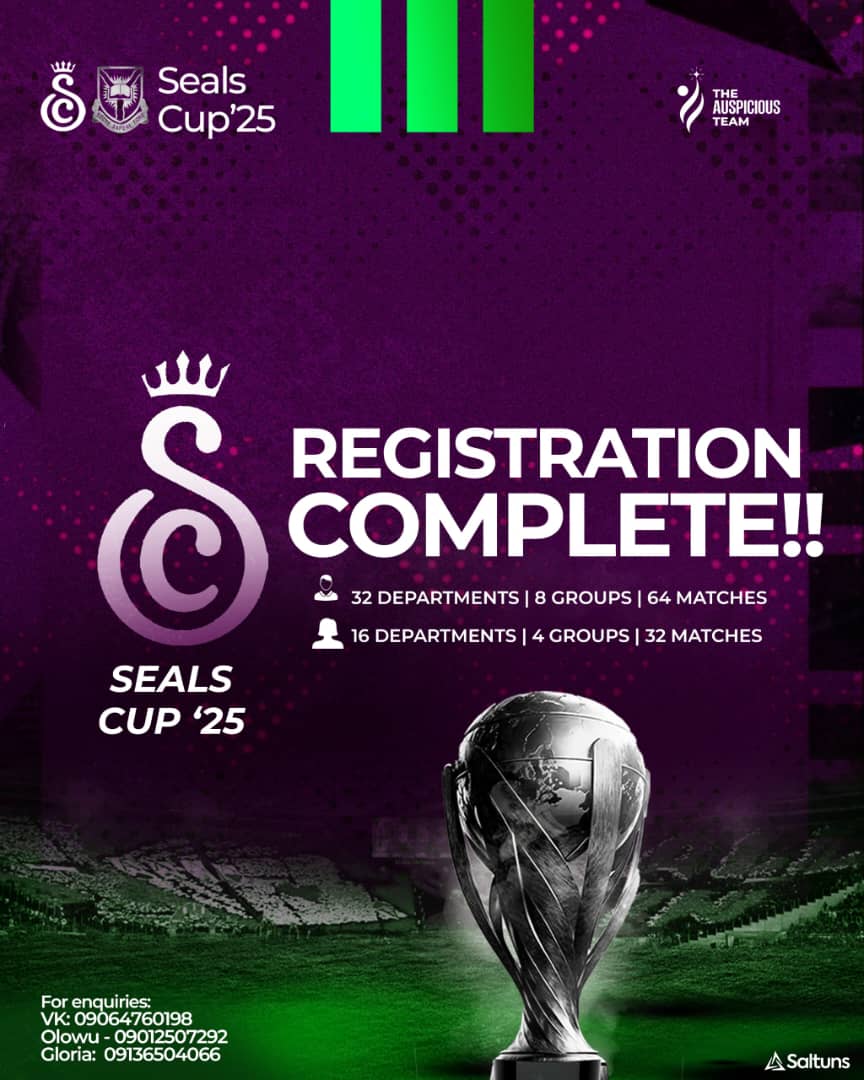
Every year, the most prestigious football competition at the University of Ibadan, the Seals Cup, never fails to deliver tears, banter, and drama. This year, the drama has started much earlier than usual; it has been eight days since the first press conference held by this year’s Seals Cup organizing committee, and from the minute the chairman of the organizing committee, Mr. Olowu Daniel, unveiled some of the rules, regulations, and innovations for the 7th edition of the Seals Cup, the WhatsApp platform—Seals Cup 2025, which was created by the incumbent Sports Secretary of the UI student union, Mr. Kolawole Victor, to cater to the release of information and promotion of this year’s edition of the Cup— has been ablaze with complaints, accusations of conspiracy, and questions about the integrity of the organizing committee.
UIMSA Press reached out to some members of the organizing committee to provide some insight as to the reasons behind some of the rules and innovations included in this year’s edition of the tournament.
Creation of departmental social media pages to promote players and generate awareness
This did not cause any backlash on the Seals Cup 2025 WhatsApp platform, as the purpose of its inclusion is clear. However, Mr. Olowu Daniel, chairman of the organizing committee, stated that as much as he wanted this to be a rule, there was no way he could enforce it. He, however, still maintained that he strongly implored all participating departments to do it, as it would elevate the level of the competition and serve as promotion for the departments, their players, and the tournament at large.
Cards and Suspensions
As reported by AFAS Press, this rule states that a player who receives two yellow cards in consecutive group stage matches will face a one-game suspension. Red cards during the knockout stages may lead to fines or suspensions, depending on the severity of the offense. The yellow card rule is in line with standard FIFA rules, but the red card rule is ambiguous. So by way of clarification, Mr. Oyekanmi Farouk, Head of the Disciplinary and Appeal Committee, Seals Cup 2025, informed UIMSA Press that on the occasion that a player is given a red card in the knockout stages, the player can be eligible to play in the next round provided the department pays the fine set by the disciplinary and appeals committee to the organizing committee. The fine will be commensurate with the severity of the offense committed by the player who was sent off. He further encouraged teams to embrace the spirit of sportsmanship and not play ‘hard.’
Uniformity in Kits
This year, hose colours will be assigned to participating departments. This is to ensure differentiation between teams, and it will prevent a recurrence of a situation that happened in the previous edition, where the eventual champions, MBBS, had their quarterfinal tie against Petroleum Engineering delayed by over an hour at the insistence of the referee to have both teams get different strips. Mr. Olowu Daniel explained that plans are in motion to invite an academy to watch players for tryouts at the finals of the competition, and it will be unbecoming to have these people watch the university’s best players play in mismatched colors.
Introduction of Esports
A worthy innovation of note is the introduction of esports as a part of the Seals Cup. The sports that will be contested are online chess, Call of Duty Mobile, and EA FC. The details of the format of each of the competitions are sparse. However, from a reliable source, the Press understands that this initiative is part of a larger “Campus Clutch” nationwide university esports tour by Nexal Gaming, powered by Engy Africa. The same source confirmed that the registration for any of the games is not limited to departments that registered for the Seals Cup footballing competition; it is open to all Uites, but there will be some sort of intra-faculty qualifiers played to determine players who get to represent their faculty. Registration for the esports starts on the 26th of May, 2025, and the Press was assured that more information concerning the games will be released to the public soon.
Provision of Health Services
The chairman of the organizing committee clarified that medical services will only be provided at the opening ceremony and from the knockout rounds. Departments should be prepared to shoulder the responsibility of providing medical services to their players during the group stages. He said the reason for this is the cost implications that the provision of these services incurred on the organizing committee last year, and this year, they are doing everything in their power to ensure that the little funds available are managed.
Player Transfers
This has been, without a doubt, the most controversial innovation introduced this year, evidenced by over 4000 messages sent within 2 days on the Seals Cup 2025 WhatsApp platform by those in support and those against it. The regulations guiding the transfer of players between departments are:
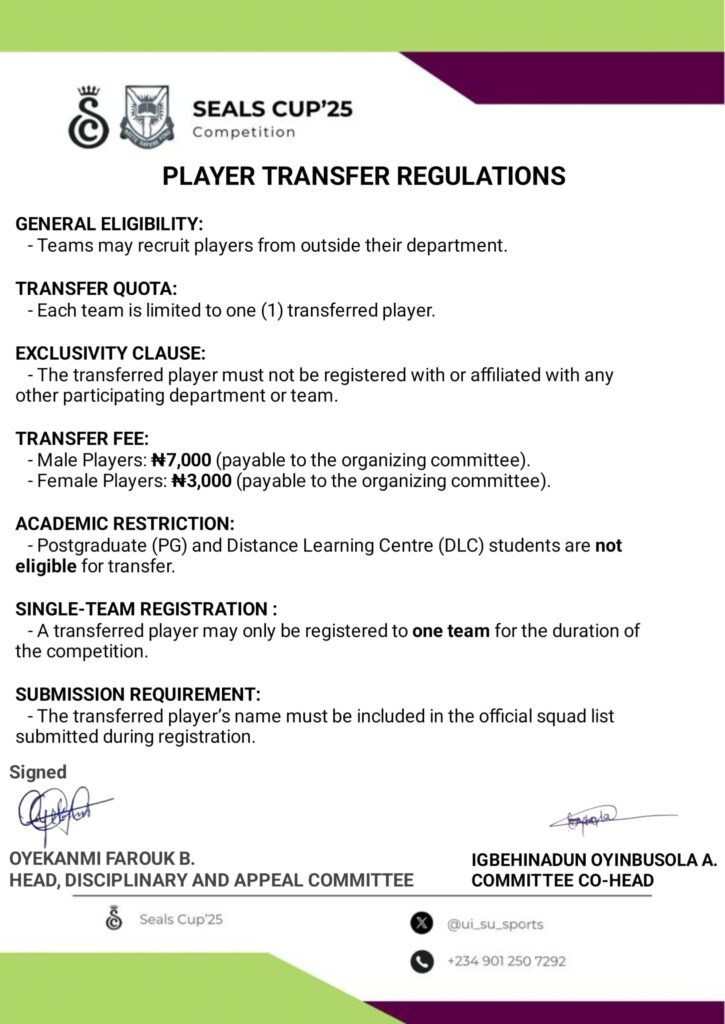
Mr. Olowu Daniel, in his chat with UIMSA Press, explained that “the Seals Cup has come a long way from when it was just a competition played amongst Social Sciences, Education, Arts, and Law. It has evolved from that to being the biggest inter-departmental competition in the school because innovations were added as the years rolled by, and if we want to maintain that the tournament is the biggest, then we must have the chance to field the best legs.”
A myriad of problems arise from this, some of which are:
- This innovation stunts the possible growth of departments with budding interest in competitive football, as their “star players” are picked off by other departments with more solid footing in the UI footballscape. So, these players are not interested in consolidating the football teams of their own departments. Rather, they will just wait till someone buys them.
- Some argued that this innovation undermines the competitive integrity of the competition. For example, what happens when a transferred player takes his borrowed department all the way, either by way of being the highest goal scorer or MVP in the competition? A lot of fans will always look back and cast a shadow over the achievements of that department because an instrumental part of their win is attributed to someone not originally from the department.
- All departments do not have the same pull. The problem this creates is that there is no level playing ground in the purchase of players, because star players from unregistered departments are far more likely to accept being bought by already strong teams, hence making these teams even stronger. This increases the gap in the quality of players among the registered teams.
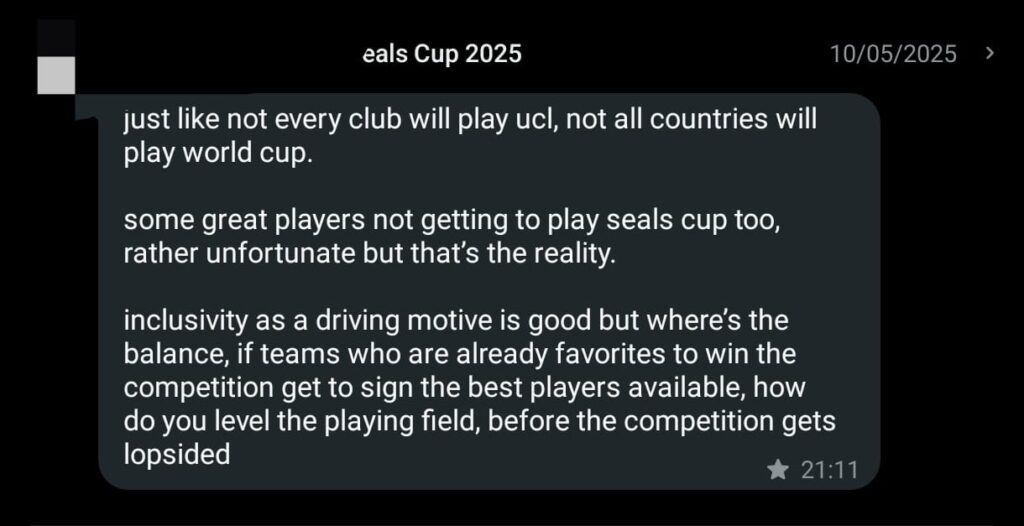 Screenshots from the Seals Cup 2025 WhatsApp Group Chat
Screenshots from the Seals Cup 2025 WhatsApp Group Chat - Displacement of bona fide members of some departments. Some departmental players are registered to fill up squad roles, and they feel content in these roles, as they contribute their quota to the success of their department. The introduction of this innovation implies that such players won’t make the cut anymore, as they would be replaced by players who are not even from their department.
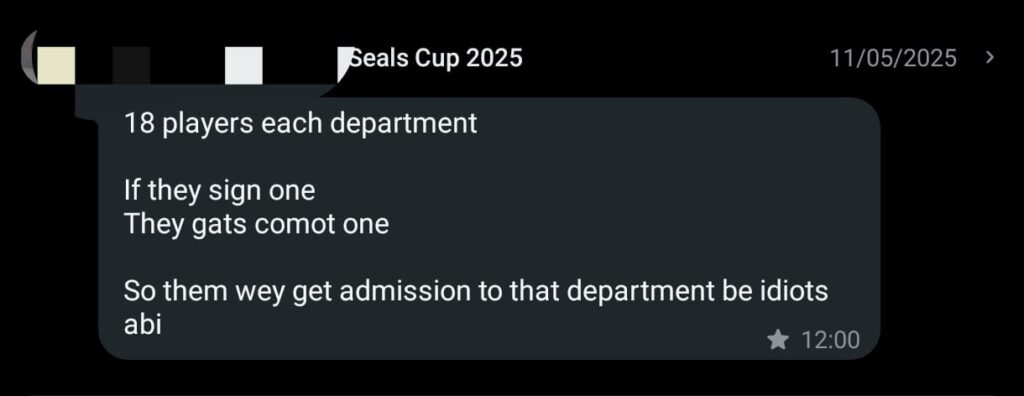
- One of the reasons for this innovation, according to the organizing committee, was inclusivity. Why, then, are postgraduate (PG) and distance learning (DLC) students excluded from being bought? The head of the disciplinary and appeal committee, Mr. Oyekanmi Farouk, responded to this, saying the reason was to maintain competitive balance. Some teams rely on this set of students, so the number of students eligible to be registered is capped. If they are included among the transferable players, this cap may be passed. He, however, added “that the exclusion of PG students was an oversight, which has now been rectified in the updated guidelines (which haven’t been released yet). That of the DLC students still stands, though, because they do not pay sports levy and do not participate in SU elections; therefore, they have no formal obligation to be included in sporting activities.”
- Another problem that was raised is the amount to be paid and the body receiving the payment. On the one hand, #7,000 (male) and #3,000 (female) is a lot of money to buy players after having registered with #25,000 (male) and #10,000 (female). It’s even worse that the set amount is the same for all transferable players when not all players offer the same quality. On the other hand, many people asked why the money was being paid to the organizing committee. Mr. Olowu Daniel’s response to this was, “Everywhere, a percentage of money is given to the football association whenever a player is transferred. The amount paid is to allow a foreign player to be registered as a member of your department. If there is an agreement between the department and the player to pay the player, then that’s none of our business. The money you are paying is for registering someone who does not belong in your department to play in the competition. This money is more like a commission or a percentage.”
- One issue raised on the WhatsApp platform was the imposition of the transfer innovation on the competition without asking the opinion of the sports directors and, by extension, the players. To this, the chairman said that the decision to include this innovation in this year’s edition of the Cup was made before departments registered, so there was no way he could have informed the sports directors of the participating departments.
 Screenshots from the Seals Cup 2025 WhatsApp Group Chat
Screenshots from the Seals Cup 2025 WhatsApp Group Chat - The last major concern was unfairness. There are claims that some departments already knew of this innovation before it was announced to the public, and as a result, they had already wrapped up negotiations with players they were interested in before other departments even got a chance to make a move on those players. Specific examples include Adewole Abdul-Samad (Agbowo) of Physics Education and Akorede Obatuyi of Educational Management. Some claimed that Industrial Production Engineering (IPE) had already sealed the signing of Agbowo and Political Science, Korede. It went as far as saying that Korede had already played a friendly match as a member of the Political Science team.
Truly, players like Agbowo, Korede, Sulphur, Akandu, and the rest are currently some of the best on campus, but they have been dealt a bad hand regarding the departments they are in. There are world-class players like Haaland who have never been able to play in the World Cup because they play for countries like Norway. This doesn’t mean some other country can snatch them up and get them to play for them because they deserve to showcase their talent on the biggest stage. It is harsh, but if allowances like these are made, where would the line be drawn as to what level of inclusivity is too much?
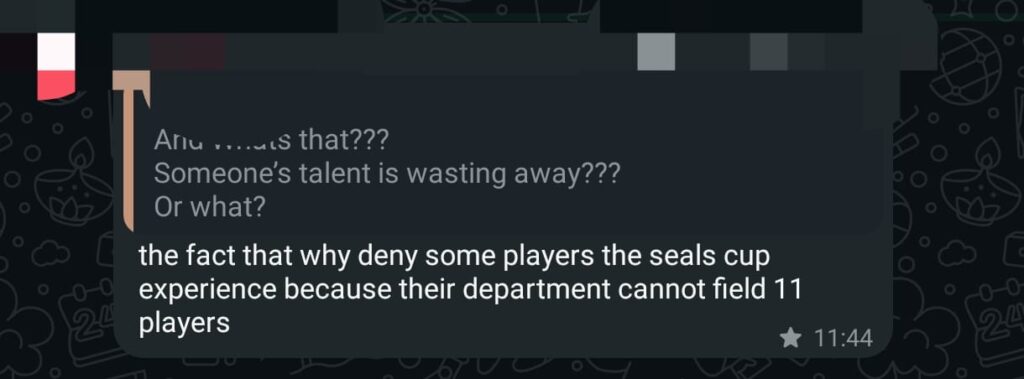
Moreover, their departmental teams participate in Dean’s Cups and some other intra-faculty competitions; if these talents are as good as they say, why then can’t they step up and become talismans for their respective departments by leading them to the biggest stage of football in the University of Ibadan?
At the end of the day, while the idea behind the introduction of the innovation is great, it appears that the cons outweigh the pros. And even though the chairman of the organizing committee maintains that all the sports directors of the registered departments have not complained about the transfer innovation. It may serve the committee well to hold an official poll amongst the sports directors of the registered departments as to whether they would like to move on with the competition as is, to allay the feelings of imposition. It remains to be seen what action the organizing committee will take.
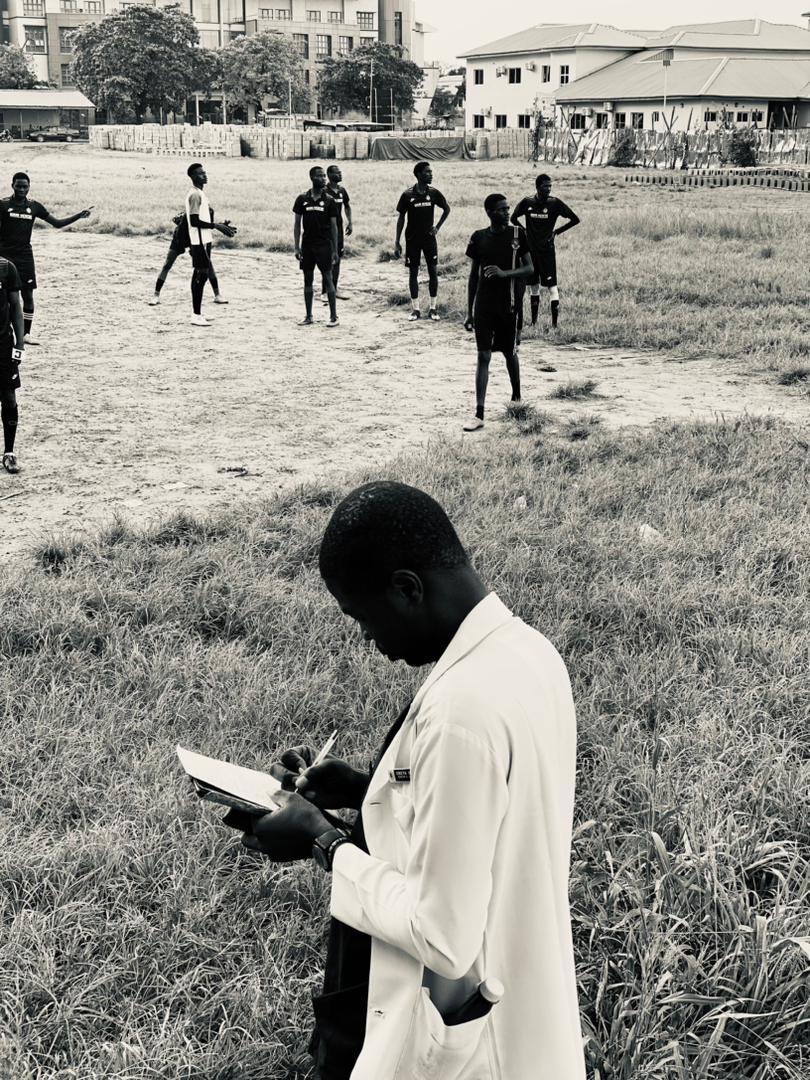
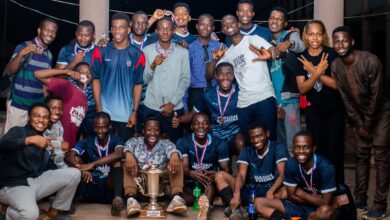
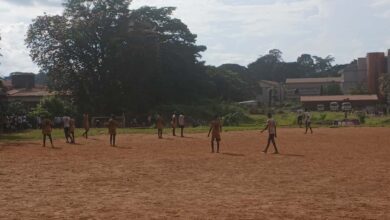
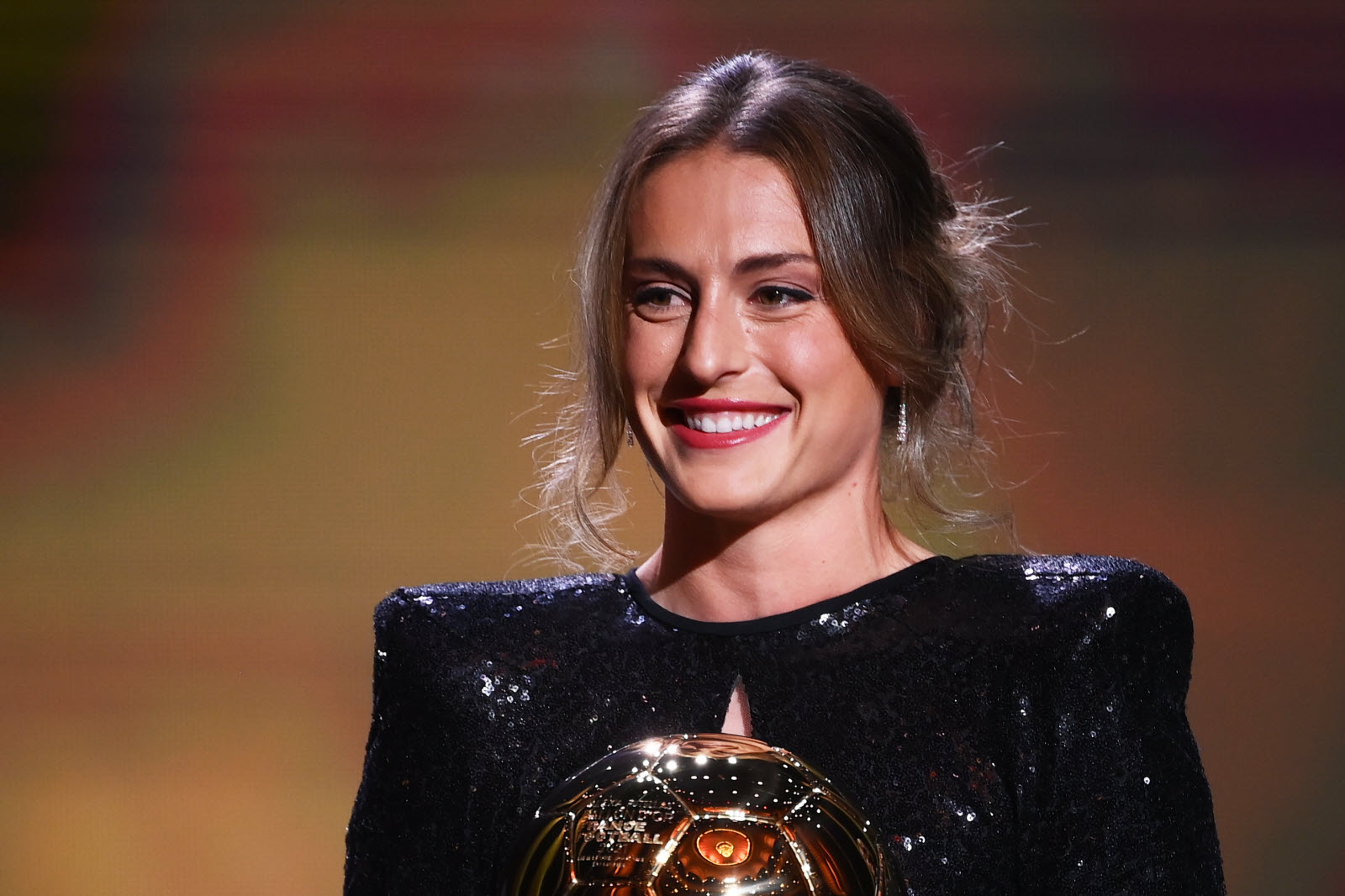
The hose colour is a very unnecessary addition cos its very useless, because how does hose colour affect the recognition of different teams on the pitch?if the jersey colour is different the match is good to go